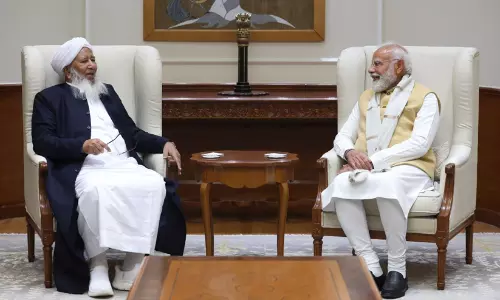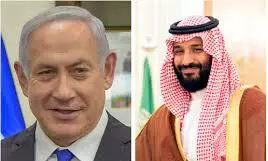
Saudi Arabia puts a pause on deal with Israel amid escalating war with Palestine
text_fieldsRiyadh: Saudi Arabia has decided to pause its US-backed plans to normalise relations with Israel due to the ongoing conflict between Israel and the Palestinian group Hamas, according to two sources familiar with Riyadh's stance.
This move signals a swift reassessment of Saudi foreign policy priorities as violence escalates in the region.
The conflict has also prompted Saudi Arabia to engage with Iran, with Saudi Crown Prince Mohammed bin Salman holding his first-ever phone call with Iranian President Ebrahim Raisi. This communication aims to prevent a broader surge in violence across the region, reported Reuters.
The delay in the US-backed talks on normalisation with Israel was considered a key step for Saudi Arabia to secure a US defence pact in return. Until October 7, when Iran-backed Hamas initiated the conflict by launching a devastating attack on Israel, both Israeli and Saudi leaders had been indicating progress towards a deal that could have reshaped the Middle East.
Previously, Saudi Arabia had maintained that its pursuit of a US defence pact would not be derailed even if Israel did not provide significant concessions to the Palestinians in their quest for statehood. However, sidelining the Palestinian issue could risk angering Arab nations in the region, especially as Arab news outlets broadcast images of Palestinians killed in Israeli retaliatory airstrikes.
The first source familiar with Riyadh's thinking stated that the talks cannot continue for now, emphasising that Israeli concessions for the Palestinians should be a higher priority when discussions resume. This indicates that Riyadh has not completely abandoned the idea of normalising ties with Israel.
As of now, the Saudi government has not responded to requests for comment regarding this development.
The Saudi reconsideration underscores the challenges facing Washington's efforts to enhance Israel's integration in a region where the Palestinian cause remains a significant concern for Arabs. The normalisation of ties had already been considered taboo in the Arab world, and the current conflict has only amplified this sentiment.
US National Security Advisor Jake Sullivan clarified that the normalisation effort is "not on hold" but noted that the focus is currently on other immediate challenges.
The first source familiar with Saudi thinking mentioned that Washington pressed Riyadh this week to condemn the Hamas attack, but Saudi Foreign Minister Prince Faisal bin Farhan pushed back. A US source familiar with the issue confirmed this.
The ongoing regional conflict has also led to the first conversation between the Saudi crown prince and Iran's president, following a Chinese-brokered initiative that prompted the Gulf rivals to re-establish diplomatic ties in April.
A Saudi statement emphasised that the crown prince assured Raisi that the kingdom is making maximum efforts to engage with all international and regional parties to halt the ongoing escalation, highlighting Riyadh's role in containing the crisis.
A senior Iranian official informed Reuters that the call aimed to support Palestine and prevent the spread of war in the region. Another Iranian official revealed that the call lasted 45 minutes and had the blessing of Supreme Leader Ayatollah Ali Khamenei.
Saudi Arabia has been actively seeking to ease tensions in the Middle East, including efforts to end the conflict in Yemen, where Riyadh has led a military coalition against the Iran-aligned Houthis.
In response to Raisi's call with the Saudi crown prince, a senior US State Department official stated that Washington maintains constant contact with Saudi leaders, with Secretary of State Antony Blinken holding several calls with his Saudi counterpart.
The official also mentioned that Washington is reaching out to partners with channels to Hamas, Hezbollah (a Lebanese armed group aligned with Tehran), or Iran, encouraging them to influence Hamas to cease its attacks, release hostages, prevent Hezbollah's involvement, and keep Iran out of the conflict.
The first source familiar with Saudi thinking stressed that Gulf states, including those with ties to Israel, are concerned that Iran might become entangled in a conflict that would affect them.
Alex Vatanka, director of the Iran Program at the Middle East Institute in Washington, pointed out that the past week highlighted the divergence in the Saudi and Iranian visions for the region. While Saudi Arabia advocates regional cooperation and economic development, Iran appears to prioritise confrontation with Israel as its primary goal.























